- Home
- Peter Carey
Jack Maggs Page 5
Jack Maggs Read online
Page 5
“A very poor type of scholar, I’m afraid.”
“With a set of German scales on the counter and the cheese in a glass case labelled ‘Pastry.’ ”
“Dear Lord,” said Percy Buckle. “Who told you that?”
“My secret,” said Oates, continuing to shake Percy Buckle’s hand, “is that I once bought cheese from you, never imagining we would meet in these circumstances. It has been a wonderful evening for me, Mr Buckle, to see you so comfortably ensconced here with your servants and your Gibbon.”
“Bless me. I hope you found satisfaction in the cheese.”
“Indeed,” said Tobias Oates, his hand still held but now retired from shaking. “Great satisfaction, for I went straight across the road to the baker’s window . . . he had a sort of serving hatch with . . .”
“Mr Freepole . . .”
“Mr Freepole’s is it?”
“Dead now,” offered Percy Buckle.
“Indeed, dead. And bought a little loaf of bread and made myself a small picnic in that old church yard in Cutter’s Close off Saffron Hill.”
“We remember everything, eh, Mr Oates!”
“Indeed,” said Tobias Oates, finally excusing himself the handhold. “It has been,” he said, using his free hand to indicate his host, the grim footman, the open door, “a night to remember . . . and goodnight to you, Jack Maggs Esquire.”
“Goodnight, Sir,” said Jack. And had no choice but to stand like a fool as the man who had robbed him walked away undamaged.
But then Jack Maggs had the good fortune to be dismissed to bed.
He rushed up the stairs into his attic and, upon entering, extinguished his candle. He rushed to the dormer window. He opened it, and poked his coiffed head out into the rain.
“By Jove,” he heard a familiar voice float upwards. “I’ll tell you this, Hawthorne. You are mistaken, most grievously mistaken.”
Jack Maggs lifted his window sash as high as it would go, and when it jammed half-way he would not be stopped but squeezed himself like a python through the opening, his shiny buckled feet first, then his stomach, then (painfully) his shoulders, until he was standing on the steep and mossy slates three giddy storeys above the street.
Keeping his hand on the window ledge, he looked down over a thin line of guttering and confirmed with his eyes that which his ears had already told him: there, forty feet below, was little Tobias Oates, standing in the rain.
“I may be mistaken about what has occurred in private,” said Hawthorne. (He had his foot on the steps of Mr Buckle’s coach, but did not seem inclined to enter.) “But I am not mistaken about the Unholy Passion in the air.”
“I am sure you are mistaken.”
“I have ob-served,” said Hawthorne, “how the two parties are besotted.”
Jack Maggs released his hold of Mr Buckle’s window ledge and then edged his way across the slick roof tiles until he reached the partly open window of Mr Henry Phipps’s dormer.
As he hooked his fingers under the sash, he heard the noise of steel rolling along cobblestones. He looked down and saw the carriage moving away with Edward Constable standing ramrod straight on the footplate at the rear of it.
Tobias Oates, however, was walking. He was crossing Great Queen Street diagonally, heading east.
Mr Phipps’s dormer window yielded, opening sweetly to its full extent.
Jack Maggs entered. He bumped into a wash-stand and sent the water jug crashing. He cursed and, in a sudden fit of temper, kicked at the pieces. He found the door and then the stairs. He ran down two flights in total blackness but on the first-floor landing fell over an abandoned trunk from which silver sugar bowls and tea pots rolled, together with the intruder, all the way down to the hall below, where they lay about him on the carpet, their round forms hidden in the dark.
He stood slowly, feeling the pains in his back and ribs.
For this he laboured? To stand in Henry’s hallway like a thief, his breeches smeared with London soot?
He unlocked the front door slowly and set off after Tobias Oates, hobbling north along Great Queen Street in his pinching shoes.
10
“I MAY BE MISTAKEN about what has occurred in private,” Henry Hawthorne said in his great booming voice. “But I am not mistaken about the Unholy Passion in the air.”
“You are mistaken.”
“I have ob-served,” said the actor, grasping Tobias Oates’s shoulder and squeezing it very painfully, “I have ob-served how the two parties are be-sotted.”
“My hat is off to your nightmare fancy, Nuncle.”
Tobias could not walk away for fear this would cause Hawthorne to speak even louder. He could only hope that the other guests, impatiently waiting inside Mr Buckle’s coach, might imagine that the “passion” so discussed somehow related to the dinner just ended.
“Really, Hawthorne, you do not give either of the parties any credit.”
“My dear Tobias,” the actor said fondly, swinging from the coach with one arm. “I give you every credit.”
“Good.” Oates tipped his hat abruptly. “Then you will see me tomorrow at Rules.”
And then he fled, or so it felt, into the wet night with his coat drawn around him tightly, whispering to himself as he scurried round the corner from Great Queen Street, “Good God. Great good God.”
Tobias Oates was twenty-four years old, and for twelve months past he had been the head of a family which now consisted of his wife, Mary, his son, John, and his wife’s younger sister, Elizabeth. Having come from no proper family himself, or none that he could remember without great bitterness, he had for all his short, determined life carried with him a mighty passion to create that safe warm world he had been denied.
So it was that he was now the husband of a rosy-cheeked and broad-hipped wife who in no way resembled that pinched and worried woman who had brought him so resentfully into the world. He was the father of a babe just three months old, a boy, whom he doted on as his father had never doted on him. And if he had no more than a florin in his pocket, he was also still the master of a substantial house, a place of books and laughter, of colourful rugs, of mirrors, these last being desired for their light: he would not have his son grow up in dreariness, or darkness. He had a long dining table that could welcome his wife’s aunts and uncles, and there was a splendid alcove in the parlour big enough to accommodate a twelve-foot-high fir tree at Christmas. It was towards this pleasant house in Lamb’s Conduit Street that he now walked briskly, but not quite directly. He could not arrive there yet. He was too agitated by this conversation which had set his heart beating wildly in his chest. Instead he set off down to Lincoln’s Inn Fields—the long way home—to calm himself.
His secret had been seen.
This secret pressed at him all day long, and as he set out through the dark streets towards the place where the secret had its nest, it was with the most perplexing mixture of feelings. He walked briskly—some would say fiercely—with his shoulders back, a fast sort of duck-toed march as if he were intent on Moscow, as if he could escape his secret, which was that he was in love with his wife’s sister.
This had never been his intention, and had begun through no other enthusiasm than their mutual concern for his wife, who had been confined to bed in the last months of her term. This confinement, coinciding with their moving into Lamb’s Conduit Street, brought Tobias and Lizzie intimately together, necessitating the shouldering of small domestic offices which a husband and wife might more properly have performed together. The final act of their tragedy had been completed by no other agency than a heavy counterpane which they had folded together, halving, quartering, until they were, by reason of their honest household labour, brought into temptation.
No one who knew Tobias, not even the old actor who thought he saw the “thunder,” had any understanding of his unholy thirst for love. He had not known it himself. He did not know the curse or gift his ma and pa had given him: he would not be loved enough, not ever.
/> He never really knew this truth about himself, not even when the fame he craved was finally, briefly, granted him and he travelled from city to city like a one-man carnival act, feeding off the applause of his readers. Even when it was thrown in his face, so to speak, he did not see it.
In 1837 he had even less idea of his own character. She was eighteen years old, he defiled her. Toby, Toby. He had been at church an hour before he did so. Now he would have abandoned all hope of Paradise for her.
Afterwards, they knelt side by side and made solemn vows to God, which vows they soon broke, once, then twice, and again, in the little garden, in the rain, in his study at three in the morning. She was a child and he was a fool, worse than a fool. He was worse than the father whom he would never forgive, and only minutes after having escaped the wine-stained Henry Hawthorne, he was thinking of her again. He gave his florin to a beggar in Lincoln’s Inn Fields.
11
JACK MAGGS WAS famously fast upon his feet, but now he was half-crippled by his dead man’s shoes. God damn, but they cut him. They squeezed his toes in their vice. They cut his heel with their hooks. He took them off, but then suffered another wound on account of this: so he had no choice but to stop and put them on once more. With all this fuss, he almost lost sight of Tobias Oates, and had the writer not begun to sing so free and careless, he might have disappeared into the fog. But then, by Jesus, there came that fine tenor voice, not twenty yards ahead. “Sally in our Alley.” It was a filthy song.
He had the bastard. He had him easy-peasy. He limped along behind him to Lincoln’s Inn Fields with his shoes torturing him at every step. It was only pain, or so he told himself. He had suffered worse.
As the song arrived at that place where “Nature’s soft stream was flowing” they came to coal-dark Carey Street. By then they were but fifteen feet apart.
In Chancery Lane a great lurching galoot of a link boy came rushing up the pavement holding his blazing faggot high into the night. The link boy, all of fifty if he were a day, was providing light for two young gentlemen, who were, in turn, attempting to escort a little whore, and all three of them as drunk as Captain Harry’s horse.
As Tobias Oates turned to look at the link boy, Jack Maggs stepped back into the doorway of the Great High Court where he found a second whore busy at her trade and not pleased to have the interruption. A moment later Jack Maggs was out in the street again, making himself one of the party with the puffing link boy, boldly sharing the smoky light as far as Theobald’s Road. He was just in time to see Tobias Oates turn off into the darkness.
Jack Maggs hobbled across the path of a hackney cab, then hip-hopped along Lamb’s Conduit Street. For reward he saw Tobias Oates step up onto the front step of a house. He arrived outside this door in time to hear a heavy bolt slid home into its hasp.
Then a sudden light flooded through the fog behind him, throwing his own massive shadow on the door.
“So,” said the man with the lamp. “What’s up here?”
At first Maggs thought it was a soldier behind the lamp, but it was a bobby, an esclop, a frigging peeler with a fancy coat. Jack Maggs had not seen this type of coat before.
“You would not want to swap your uniform with mine, for all the tea in China,” said he cheekily. “They give me shoes, the shoes don’t fit. They send me out to walk behind my master, and not even a topcoat to bless myself with.”
The peeler was a big strong fellow with a face like a potato. The look in his eye, as he held up his lantern, was the same one you see in a policeman who would like to harm you badly, if only he could do it at no risk to himself.
“Where’s your master?” he demanded.
“Just went in.”
“Went in where? I didn’t see no one.”
The peeler ran his lantern over Jack Maggs again and there revealed the damage done by the journey across the roof, the tumble down the stairs, the subsequent excursion through the drizzle. The Knight of the Rainbow was in a sodden, speckled state.
“Just went in,” Jack Maggs said, suddenly very sharp indeed. “Right here. Mr Tobias Oates. The author of the tale of Captain Crumley.”
The esclop pushed his hot lantern a little closer to Jack’s nose.
“Captain Crumley?”
“That’s the one.”
The bobby paused. “Get on home,” he said at last.
There was no choice. Jack Maggs opened the gate, walked down the steps into the area. There, below street level, he pressed himself flat against the kitchen door, but Mr Peel’s man was not so green. He held up his lantern and peered down after him.
It was Despair made Jack Maggs try the kitchen door handle, and Fortune decreed it be left carelessly unlocked. He entered Tobias Oates’s house and slid the bolt behind him. Through the kitchen window he could see the bobby’s legs as they walked back towards the front door.
The village pony was not satisfied—it seemed he was going to knock up Tobias Oates and ask him questions about his footman. Jack Maggs therefore crept up the dark stairs into the hallway, ready to flee out the back if the policeman knocked.
At first he stood hard and still as a log of wood, but when it was clear that the policeman had walked on, he relaxed. Still he did not move, but stayed exactly where he was, breathing deeply.
Elsewhere in the household he heard a flurry of whispering and the fast shuffle of bare feet, and then, not too much time after, the old familiar music of a squeaking bed.
12
IN THE PLACE JACK MAGGS had most recently come from, the houses had been, for the most part, built from wood. They strained and groaned in the long hot nights, crying out against their nails, contracting, expanding, tugging at their bindings as if they would pull themselves apart.
Tobias Oates’s house in Lamb’s Conduit Street was built from London brick. It was newly painted, newly furnished. Everything in it glistened and was strong and bright and solid. This was a house that would never scream in the dark, nor did it reek of sap or creosote. Its smells were English smells—polished oak, coal dust, Devon apples. The intruder breathed these strange yet familiar odours for as long as it took the master to get himself to bed.
Then he crept up the stairs and, on the upper landing, drew his long arms around his chest. It was an action such as the Devil might make when surrounding himself with his cape. It might also have been by a mortal man wishing to cloak himself in Night, and if the latter were the case, Jack Maggs might be said to have succeeded, for a moment later he appeared, a slow and smudgy phantom, in a small room off the landing. Here he stooped over the small wooden crib in which lay Tobias Oates’s first-born son.
Maggs’s inky shadow flooded the crib. He leaned very close, so close indeed he might have bitten the child. Instead, he brought his wide nostrils almost up against that soapy skin and, with his arms clenched behind his back, inhaled John Marshall Oates’s breath. This act he repeated three times, and when he was done he straightened himself and placed his hands deep in his pockets. In the next room, the child’s father turned in his bed and coughed a most wide-awake cough. The intruder removed his hands from his pockets and moved slowly back into the shadow by the tall cupboard, and there his breathing became very slow and deep.
In other circumstances, Maggs had been known to act violently, but in Tobias Oates’s house he was a sloth. His heavy limbs bled into the darkness and as the clock ticked loudly in the downstairs hallway, he seemed to flow from room to room as slow as a moon-made shadow.
He stood above the bed of a young spinster. The vigour of her dreams had served to push her night cap from her head. Her hair was loose, floating like seaweed around her sleeping face. One bare white arm was flung out across the sheet, the other held between her knees beneath the covers. Beside her bed was a dresser where the intruder found a piece of jewellery, a necklace. He picked it up and ran it through his three fingers, before quietly laying it down again.
Two o’clock found him in another room, his severe hawk-nosed face an inc
h away from Mary Oates’s small down-turned mouth. He stood over Tobias Oates who was sleeping on his stomach in a perfect imitation of his son.
As the hall clock struck the quarter-hour, he reluctantly retreated to the kitchen. There he took a draught of cold water, and splashed a little on his face. The extreme agitation which had hitherto marked his face and body was no longer to be seen.
He sat himself at the kitchen table with his glass of water, and rested his eyes.
He woke with a great start to find a woman, an older big-bellied woman with strong forearms and large hands, standing over him.
She had the oil lamps lit. She was in cap and apron. “Did he tell you to wait?” she said.
“He did, Ma’am,” said Jack Maggs, automatically smiling and showing her his strong straight teeth.
“Said he was going to fetch you a shilling? Said you were to tell him your story, is that so?”
He stood and stretched. “So he said, Ma’am.”
The cook—for he assumed her to be so—shook her head and went about readying the kitchen for breakfast, riddling the grate, throwing in the coal, getting the great kettle back in its place on the cold black top.
“He cannot help himself. He saw your livery, and thought: there’s a chap with dirty livery. Just what you would think or I would think, but Mr Oates, he can’t stop there—he’s thinking, how did that fatty-spot get on his shoulder? He’s wondering, in what circumstances were the stockings torn? He’s looking at you like a blessed butterfly he has to pin down on his board. It is not that he hasn’t got a heart. Indeed, I’m like as not cold-hearted in comparison. But he is an author, as I’m sure you don’t need telling, and he must know your whole life story or he will die of it. There’s a boy from Tetley’s with a porcelain eye, he left the poor little mite waiting half the day. Miss Lizzie found the little tyke crying on the doorstep when she was going walking with the missus.”
“Well, I’ll be on my way then,” said sleepy Jack, noticing for the first time his torn stockings. “For to tell you the truth, Ma’am, I must be explaining myself to my own master.”

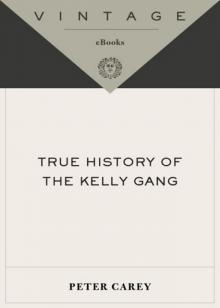 True History of the Kelly Gang
True History of the Kelly Gang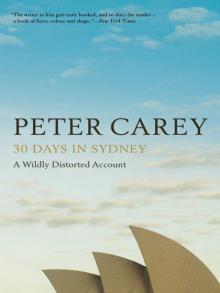 30 Days in Sydney: A Wildly Distorted Account
30 Days in Sydney: A Wildly Distorted Account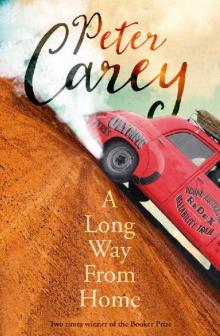 A Long Way From Home
A Long Way From Home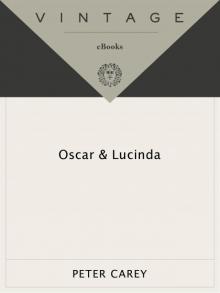 Oscar and Lucinda
Oscar and Lucinda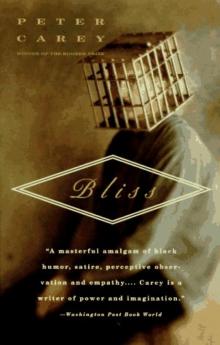 Bliss
Bliss Wrong About Japan
Wrong About Japan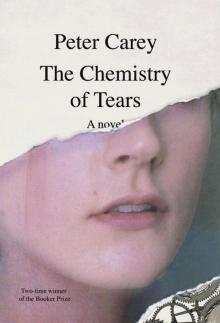 The Chemistry of Tears
The Chemistry of Tears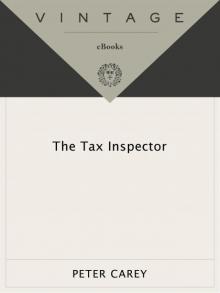 The Tax Inspector
The Tax Inspector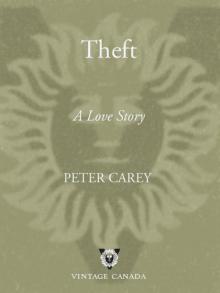 Theft: A Love Story
Theft: A Love Story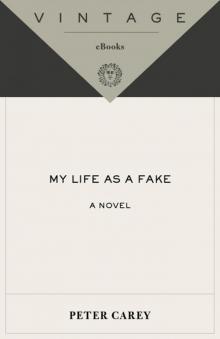 My Life as a Fake
My Life as a Fake Collected Stories
Collected Stories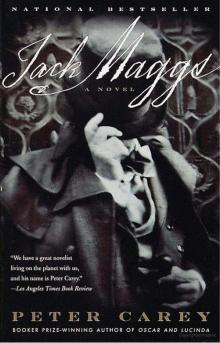 Jack Maggs
Jack Maggs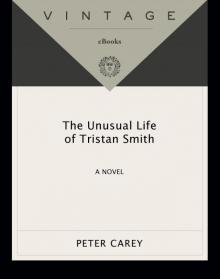 The Unusual Life of Tristan Smith
The Unusual Life of Tristan Smith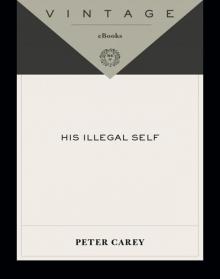 His Illegal Self His Illegal Self His Illegal Self
His Illegal Self His Illegal Self His Illegal Self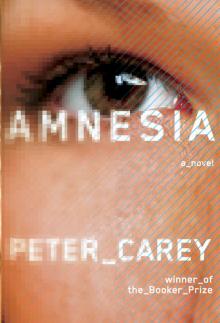 Amnesia: A Novel
Amnesia: A Novel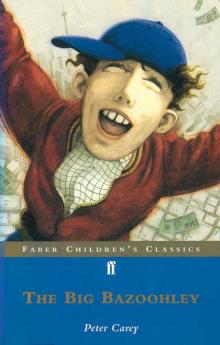 The Big Bazoohley
The Big Bazoohley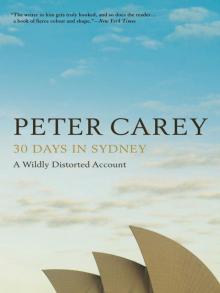 30 Days in Sydney
30 Days in Sydney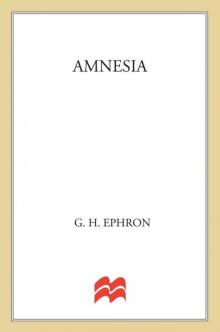 Amnesia
Amnesia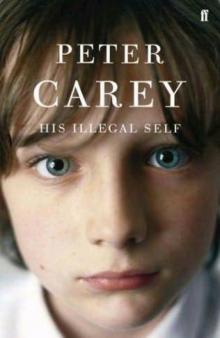 His Illegal Self
His Illegal Self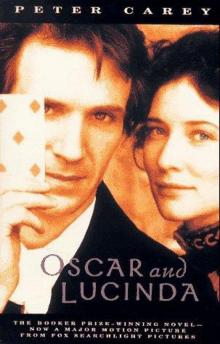 Oscar and Lucinda bw-1988
Oscar and Lucinda bw-1988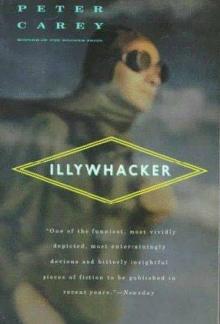 Illywhacker
Illywhacker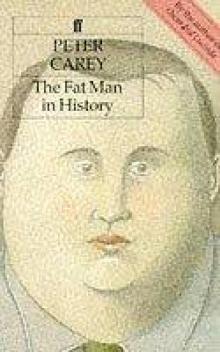 The Fat Man in History aka Exotic Pleasures
The Fat Man in History aka Exotic Pleasures